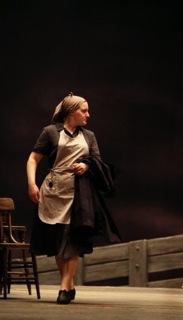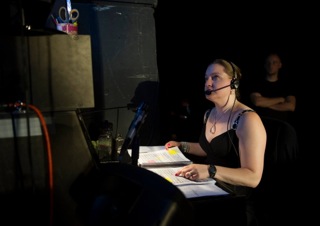|
JACQUELINE LAWTON: How long have you lived and worked as a stage manager in DC? What brought you here? Why have you stayed?
LYNN KRYNICKI: 14 years ago, then called, The Washington Opera had a job opening in their Stage Management Staff. I applied and have been with the company ever since. I get to work with a fantastic group of people, be at a Company that runs like a well-oiled machine and work on great quality products. Also, being at a Company that offers almost half a year of employment is rather enticing. Not may Opera Companies offer long contracts. I would not have stayed for 14 seasons if I did not love with whom I was working and at where I was working. JL: What excites you most about being a stage manager? What do you feel your greatest challenges are? LK: Calling a Show is the icing on the cake. Making the art actually happen is the great payoff after the weeks of hard work. Sometimes Shows are complicated, sometimes they are easy, but Calling perfect cues and hearing the audience response at the end is quite thrilling. The biggest challenges in the job are different with each production. There may be personality conflicts preventing people from working together. A production can be technically difficult or the dream for the production may be unatainable. Each time you try to facilitate the channels of communitcation to help the Team reach its goals. JL: What traits do you feel a successful Stage Manager should have to support the health and growth of a production? LK: A successful Stage Manager has strong organizational skills, people skills, communication skills, flexibility, time management skills, scheduling skills, the ability to read music (for Opera Stage Managing), creativity, leadership, empathy and compassion. JL: Does your work as a Stage Manager pay the bills? If not, what other work do you do and how do you find a balance? LK: My Stage Management work does pay the bills, however in order to make life more comfortable, I started to work as an Overhire Dresser for Local 772, the DC Chapter of the Wardrobe Union. This work keeps me in Theater and is flexible enough to work on my schedule when I am off contract. I can use my Stage Management Skills in my Dresser duties. JL: Looking at your body of work as a stage manager in this community, how conscious are you of selecting plays by women or people of color when deciding your season? LK: I am not involved with the selection of Works that Companies produce. Those decision are made before I am offered a contract. Fortunately, at my main place of employment, I am often asked what my preferences are for the coming season, but beyond that, I have no input. JL: How do you feel the DC theatre community has addressed the issues of race and gender parity? How has this particular issue impacted you and your ability to work? LK: The DC contracts under which I work are Union contracts, which specify the minimum wages for different possitions. Parity exists because the Union contract is blind to race and gender. Each possition has a specified value which is given to the person filling that possition. I am repeatedly hired due to my capabilities and excellence at my job, not because of my demographics. JL: DC audiences are ... LK: often unpredictable, but usually quite appreciative. JL: DC actors, designers and directors are .. LK: very talented and should be used more locally. JL: DC critics are ... LK: predictable. They need to put personal bias aside and focus on the impartial examination of a production. Tell a brief description of the plot, but then explore the concepts of a production, the history of a piece, and the talents of the performers, designers and director. Realize that this is live theater, not a well edited movie. The performance that you see only happens once and in the moment after it happens it lives only as a memory. Do not chastise for every little flaw, for that little flaw is lost in all the beautiful perfect memories retained after every performance. JL: What advice do you have for an up and coming DC based stage managers? LK: Get as much experience in as many different places. Don’t be afraid to take jobs in other cities. The more diverse your experience, the more valuable you are to a company. More importantly, you have to really love the job. JL: What's next for you as a stage manager? Where can we keep up with your work? LK: You can see me next at the Stage Manager’s console for Washington National Opera’s production of Elisir d’Amore at the Kennedy Center Opera House, March 20-29, 2014. www.kennedy-center.org/wno or in the Summers at Bard SummerScape fishercenter.bard.edu.
0 Comments
Your comment will be posted after it is approved.
Leave a Reply. |
My BlogI'm a playwright, dramaturg, and teaching artist. It is here where you'll find my queries and musings on life, theater and the world. My posts advocate for diversity, inclusion, and equity in the American Theatre and updates on my own work. Please enjoy!
Categories
All
Archives
June 2020
Reading List
|



